Related Research Articles
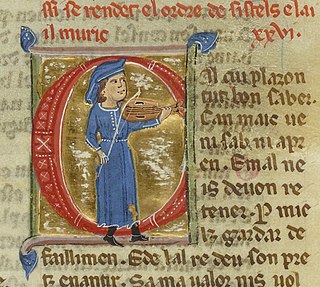
A troubadour was a composer and performer of Old Occitan lyric poetry during the High Middle Ages (1100–1350). Since the word troubadour is etymologically masculine, a female troubadour is usually called a trobairitz.

Arnaut de Mareuil was a troubadour, composing lyric poetry in the Occitan language. Twenty-five, perhaps twenty-nine, of his songs, all cansos, survive, six with music. According to Hermann Oelsner's contribution to the 1911 Encyclopædia Britannica, Arnaut de Mareuil surpassed his more famous contemporary Arnaut Daniel in "elegant simplicity of form and delicacy of sentiment". This runs against the consensus of both past and modern scholars: Dante, Petrarch, Pound and Eliot, who were familiar with both authors and consistently proclaim Daniel's supremacy
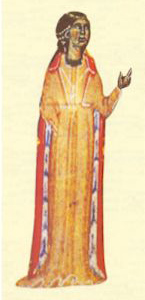
The trobairitz were Occitan female troubadours of the 12th and 13th centuries, active from around 1170 to approximately 1260. Trobairitz is both singular and plural.
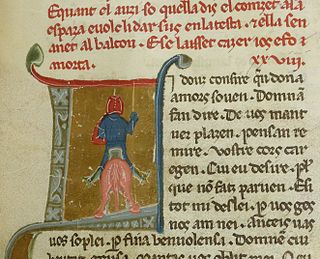
Vida is the usual term for a brief prose biography, written in Old Occitan, of a troubadour or trobairitz.
Hugh Primas of Orléans was a Latin lyric poet of the 12th century, a scholar from Orléans who was jokingly called Primas, "the Primate", by his friends at the University of Paris. He was probably born in the 1090s and may have died about 1160. Along with his younger contemporary known as the Archpoet, he marks the opening of a new period in Latin literature.
Tibors de Sarenom is the earliest attestable trobairitz, active during the classical period of medieval Occitan literature at the height of the popularity of the troubadours.
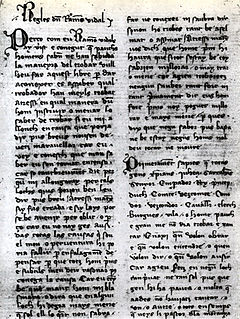
Raimon Vidal de Bezaudu(n) was a Catalan troubadour from Besalù. He is notable for authoring the first tract in a Romance language (Occitan) on the subject of grammar and poetry, the Razós de trobar, a title which translates as "Reasons of troubadour composition". He began his career as a joglar and he spent his formative years at the court of Hug de Mataplana, which he often recalls fondly in his poems and songs.

Raimon Jordan was a Toulousain troubadour and the viscount of Saint-Antonin in the Rouergue near the boundary with Quercy.

Peirol or Peiròl was an Auvergnat troubadour who wrote mostly cansos of courtly love in the late twelfth and early thirteenth centuries. Thirty-four surviving poems written in Occitan have been attributed to him; of these, seventeen have surviving melodies. He is sometimes called Peirol d'Auvergne or Peiròl d'Auvèrnha, and erroneously Pierol.
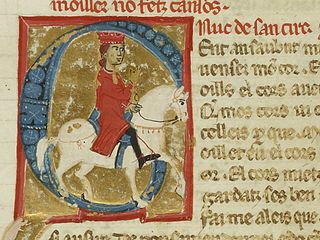
Uc de Saint Circ or Hugues (Hugh) de Saint Circq was a troubadour from Quercy. Uc is perhaps most significant to modern historians as the probable author of several vidas and razos of other troubadours, though only one of Bernart de Ventadorn exists under his name. Forty-four of his songs, including fifteen cansos and only three canso melodies, have survived, along with a didactic manual entitled Ensenhamen d'onor. According to William E. Burgwinkle, as "poet, biographer, literary historian, and mythographer, Uc must be accorded his rightful place as the 'inventor' (trobador) of 'troubadour poetry' and the idealogical trappings with which it came to be associated."

Giraut or Guiraut de Calanso or Calanson was a Gascon troubadour in the Occitan language. Of his lyric works that remain five are cansos, two descorts, a congé, a planh, and a vers. He also wrote a mock ensenhamen entitled Fadet juglar.

Raimon de (las) Salas or la Sala was a Provençal troubadour probably of the 1220s/1230s. His short vida survives. He left behind four or five poems, but he must have composed more, since he is vida records his composition of cansos, albas, and retroensas. Along with Ferrari da Ferrara, he is the only troubadour known to have tried his hand at the retroensa.
William I of Baux was the Prince of Orange from 1182 until his death. He was an important Provençal nobleman.
Simon Gaunt is a professor of French literature at King's College London. He is also president of the Society for French Studies.
Tribolet was an obscure troubadour, known only for one song, the obscene Us fotaires que no fo amoros. The song's rubric was read as t'bolet by Giulio Bertoni, who identified its composer as Tremoleta, but Alfred Jeanroy suggested the reading "Tribolet", which is widely accepted. He also suggested that the composition attributed to him is a parody of a piece now lost. The song is preserved in one chansonnier dating from the final third of the thirteenth century, the same period in which the song may have been written.
William Compaine Calin was a senior scholar of Medieval French literature and French Poetry at the University of Florida. His work has focused on Occitan Studies and on Franco-British literary relations.
Jan Ziolkowski occupies the Arthur Kingsley Porter Professorship of Medieval Latin at Harvard University. From 2007 to 2020 he served as Director of the Dumbarton Oaks Research Library and Collection. His scholarship has focused on the literature, especially in Latin, of the Middle Ages.
In Medieval Europe, attitudes toward homosexuality varied by era and region. Generally, by at least the twelfth century, homosexuality was considered sodomy and was punishable by death. Despite persecution, records of homosexual relationships during the Medieval period did exist. This persecution reached its height during the Medieval Inquisitions, when the sects of Cathars and Waldensians were accused of fornication and sodomy, alongside accusations of satanism. In 1307, accusations of sodomy and homosexuality were major charges leveled during the Trial of the Knights Templar. These allegations though, were highly politicized without any real evidence.

Frede Jensen, Ph.D., was a 20th-century, Danish-born Romance philologist, author, and professor of French. Author of 17 books and over 60 articles, he was widely respected by the romance philology community and recognized as an expert in the field. He is highly esteemed for his detailed and thorough publications on the grammar of Old Occitan and has been referred to endearingly as "the 'Grevisse' of old Occitan". Jensen is also considered an expert on Sicilian poetry. His English translation and analysis of previously untranslated Sicilian poems have been honorably referred to as one of the codices optimi on the subject, dating from Dante forward.
An extraordinary linguist, Jensen was fluent in eight languages with a remarkable command of medieval/ancient Romance languages. His publications include works on vulgar and classical Latin, old Italian, old Spanish, medieval Occitan, old French, and old Portuguese.